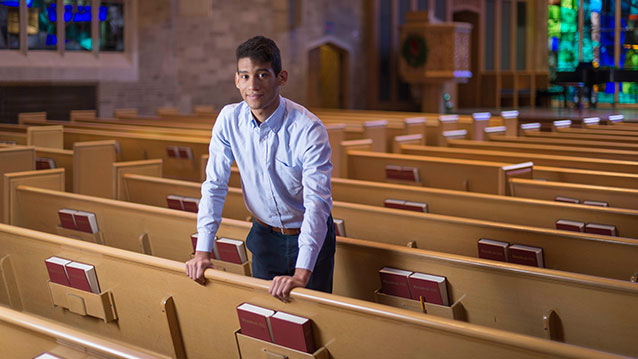This is another in a series of Q&As profiling Northwestern undergraduate researchers.
EVANSTON, Ill. --- For New York native Rafael Henriquez, environmental activism became a way of life long before he opened his first college textbook at Northwestern University.
As a student at the Bronx High School of Science, Henriquez was involved in environmental activism projects to preserve the Bronx River and the Bronx Zoo and to create a neighborhood garden. In a youth leadership program, he took cleanup trips to New Orleans and Washington, D.C.
He naturally brought that passion to Northwestern, but in the course of his studies, he realized that minority environmentalism was largely missing from the narrative.
“In my classes and the literature we were assigned, I found few narratives of people who are working class, low-income or live in the inner city pursuing environmentalism,” Henriquez said.
In other words, the research literature didn’t reflect the type of community he was raised in, “a predominantly minority community with a culture of environmentalism, awareness and activism.”
Henriquez said his activism in the Bronx had taught him “about the kinds of systemic obstacles we are dealing with when it comes to environmental justice and other social problems.”
The void in the history he was learning led Henriquez to pursue a summer undergraduate research project about how black Chicago residents have engaged with environmental issues through institutions. He zeroed in on Trinity United Church of Christ in Washington Heights on the South Side of Chicago.
By examining pastors’ documents and other primary sources written over several decades and observing the church’s current involvement with green activism groups, he “got to see exactly where and why Trinity United started to think about environmentalism” and how the movement could be used to empower communities.
Henriquez, who began his studies in engineering and environmental sciences, had never even thought of doing research before the fall quarter of his junior year. “I had an experience that could only have happened at Northwestern,” he said. “I was able to move from major to major to think about this issue very differently over four years -- and I was able to meet these profs who pushed me in the right direction all the time.”
Read more in a Q&A with Henriquez, who recently spoke to Northwestern News about his research and reflected on his time at Northwestern.
How did you start to think about environmentalism in this way?
I’ve been interested in environmentalism since high school, but I switched majors a couple of times before settling on history. And I noticed we never talked about minority environmentalism in class. I was really interested in telling that history because I thought it would help me learn more about myself and my relationship with the environment.
How did you find your primary sources?
The church has its own library and I found a lot of material there. But I also used a branch of the Chicago Public Library close to the church, the Charles G. Woodson library, which had a special collection of Trinity United’s documents. I was able to use sermon brochures, meeting minutes and church constitutions.
What did these documents tell you?
The sources revealed how the church uses Christian theology to address and solve problems of all kinds in the African-American community.
How is Trinity United engaging with environmentalism today?
The church is affiliated with an organization called Green The Church, which works to build a sustainable, green economy that address pollution and can lift African American communities out of poverty. Trinity United works with this non-profit to promote the ways a green economy can create jobs for the otherwise unemployed, encourage local business to offer nutritious and affordable foods and develop green spaces for the community.
Did you come to Northwestern thinking you wanted to do research?
I never even fathomed doing this before fall quarter of my junior year. I thought that if you don’t have a relationship with the field, with the people in the department, how could you get these opportunities? I was really happy to find Prof. [Keith] Woodhouse, who was really supportive and always made time for me to talk about my research interests.
Has undergraduate research changed the way you think about your studies?
I never saw myself doing history, but I’ve realized I like asking questions about what happened in the past and tying together different strands of what people have written. I plan to apply to graduate school in the next few years, but because of my research, I’ve also begun to think about the different ways I can continue to do community work, in communities like the one Trinity United serves or back home in the Bronx.


